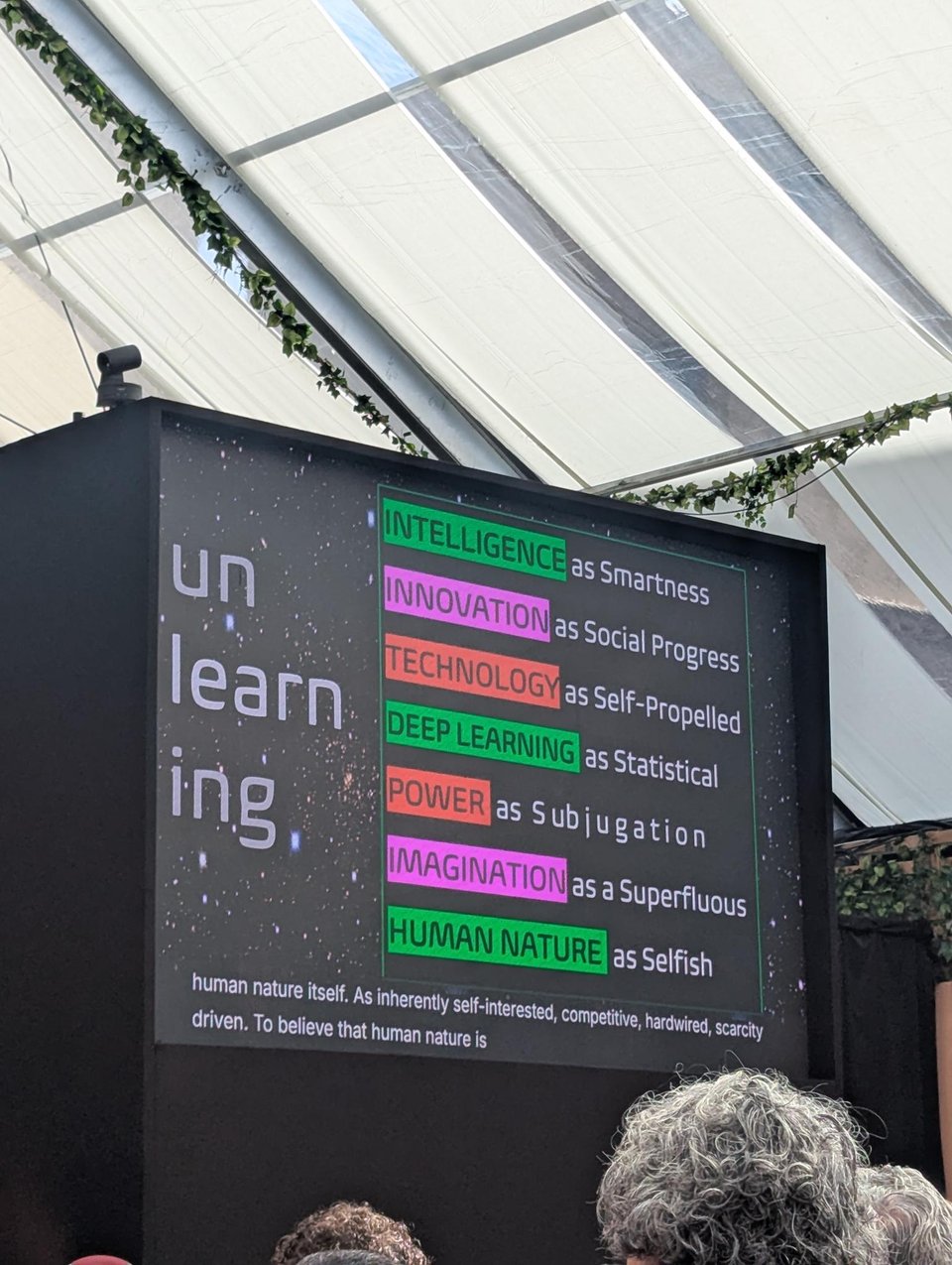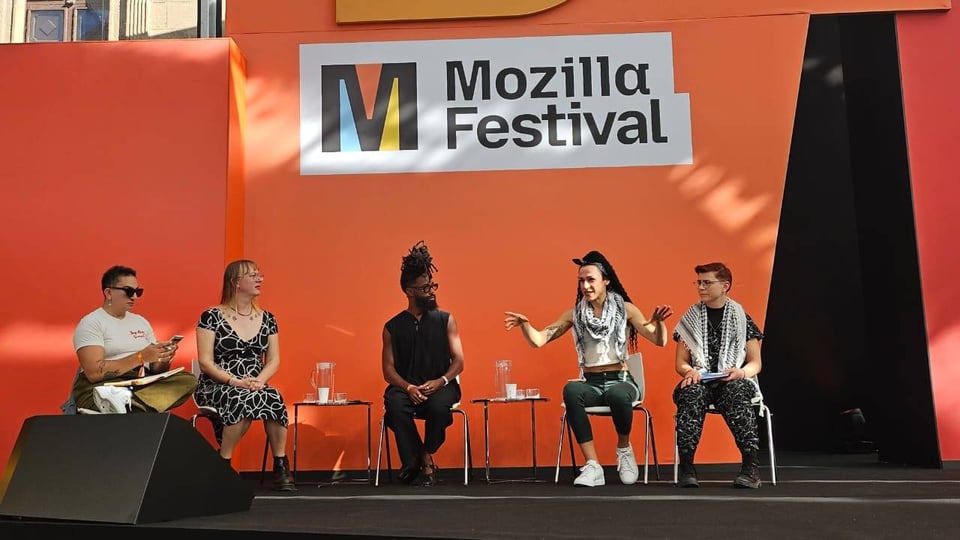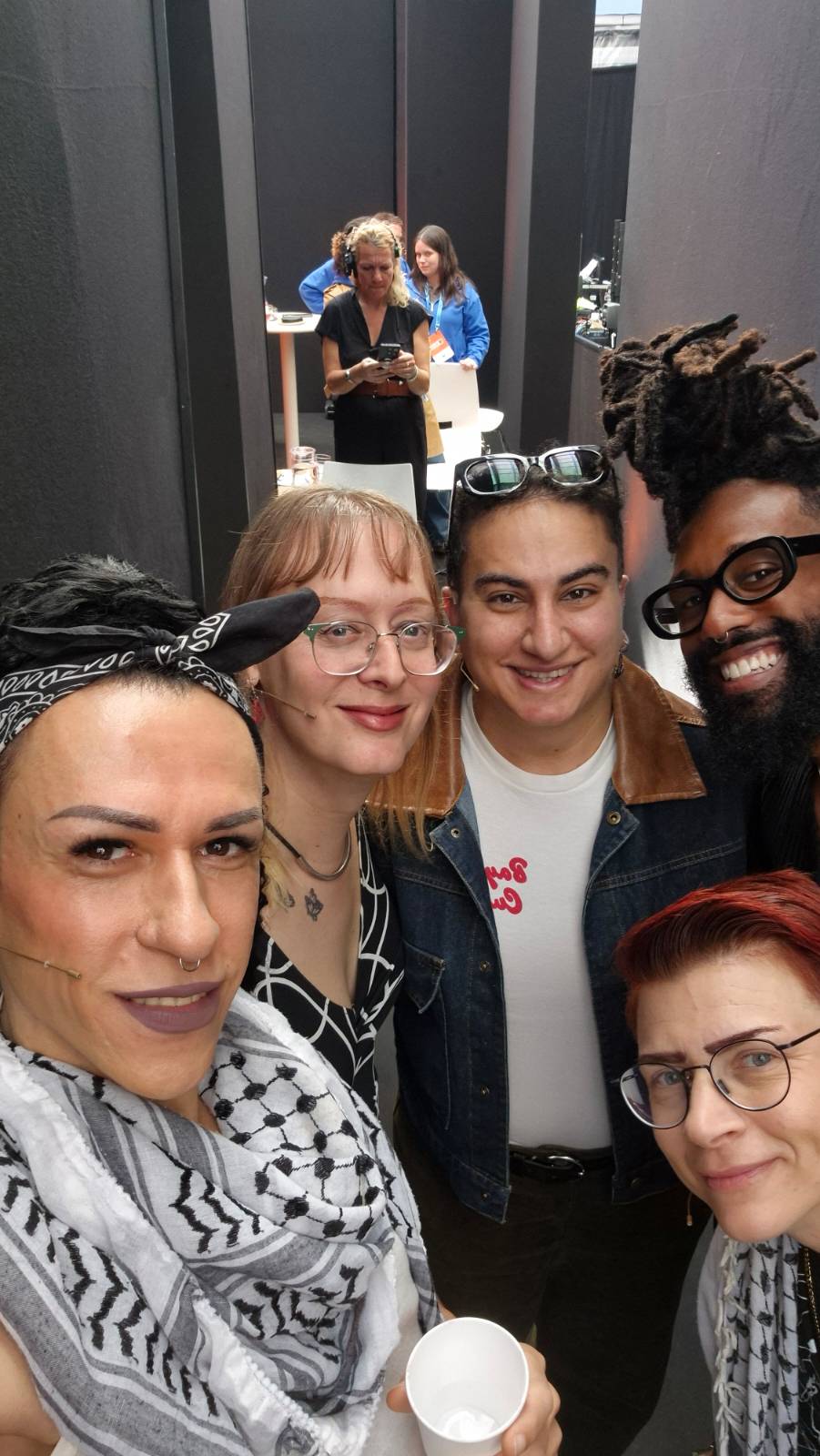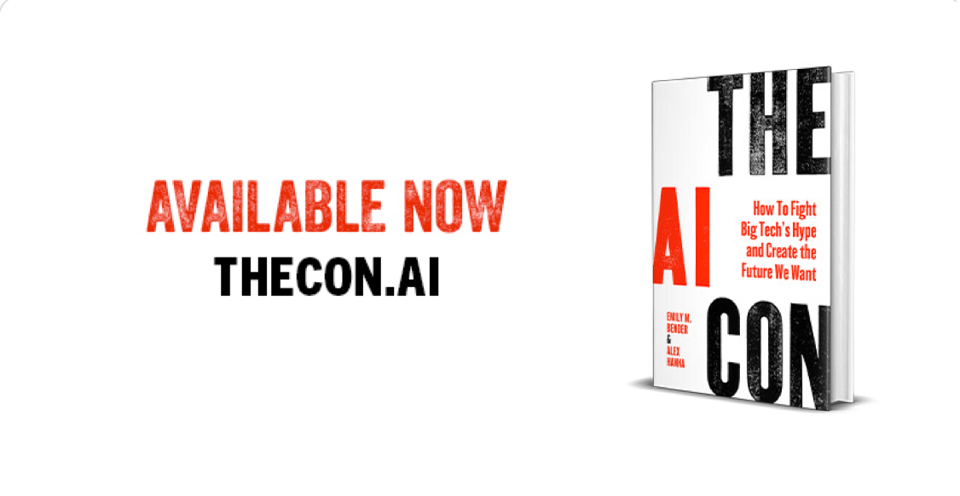MozFest 2025: Rupture, Narrative, and Trans Justice
I had the opportunity to attend MozFest -- Mozilla's annual festival -- the weekend of November 7 to 9 in Barcelona, Spain. Taking place in the absolutely beautiful Poble Espanyol, the conference featured a mix of artists, programmers, thinkers, and technologists of all stripes. It was my first time at MozFest, and while it was mostly good, there were moments of rupture, of breakage, and of rebuilding which were very necessary. More on that in a bit! I had an incredible time connecting and reconnecting with many friends and making new ones.
The theme of the weekend was "unlearning", and unwieldy as it is to premise of conference on a negation, it worked well as a starting point for conversations. The weekend opened with a provocation from Professor Ruha Benjamin in a talk titled Deep Unlearning. Dr. Benjamin exhorted us to unlearn notions of:
intelligence as smartness
innovation as social progress (following Toni Cade Bambara: "not all speed is movement")
technology as self-propelling
deep learning as statistical
imagination as superfluous
power as subjugation
human nature as selfish

Asking us, "who owns the future?" she also challenged us to consider the idea of "ownership" of the future at all, and instead, consider the power of imagination. "We are trapped in the tech broligarchy's imagination," a time of monsters (following Gramsci, as Nabiha Syed, the new head of Mozilla Foundation, put it). To conclude, Prof. Benjamin urged us to consider what's next and concluded with a quote from Octavia Butler: "The world may be ending, but there are other worlds."
Amongst the sessions I attended, there were two projects which I want to highlight. The first, organized by Matt Mahmoudi from Amnesty International and Coline Schupfer Galia from The Collaborative Research Centre for Resilience, featured a collective mapping exercise for resistances to border violence. Resistance included not only countersurveillance measures, interventions into local procurement processes (such as the community intervention to stop the renewal of the Flock cameras in Oakland) and more individuals' refusal to submit to surveillance, but also making fun of surveillance infrastructure dressed up like public works. A participant recalled a new surveillance architecture dressed as public art. Apparently, it just looks like shit. Ridicule as praxis, as it were. You can find their mapping project over at the Everywhere Border.
The second session, organized by Kambale Musavuli from Center for Research on the Congo-Kinshasa, highlighted the materiality of lithium, cobalt, and coltan extraction in the Congo. Musavuli highlighted the networks of corruption, of shading dealing, and of the scale of violence necessary for the AI gold rush. He connected the extraction not only to the production to semiconductor and battery production, but also to warmaking tools of Lockheed, Northrop Grumman, and Boeing.
I took the stage twice, once in a planned debate on "Unlearning Privacy" with Udbhav Tiwari from the Signal Foundation, moderated by Lauren Hendry Parsons from the Mozilla Foundation. You can catch the video here. We discussed how privacy is non-negotiable, and shouldn't be considered a privilege to only those who can afford it. As for my own part, I argued two things: we need to unlearn the notion that privacy is a solved technical problem. Certain proposals, like differential privacy and federated learning, consider privacy as something which can be embodied in design. But, as Deirdre Mulligan and others argue, privacy is an "essentially contested concept": "privacy is transformable according to changing technological and social conditions." A good example is something we discuss in The AI Con, on Microsoft's deployment of Windows Recall:
This would seem like a privacy win but security researchers quickly showed how the data could be accessed remotely-and that doesn't even include cases where the malicious person accessing the data is in the user's own home. Imagine a victim of intimate partner violence searching for information on how to leave their abuser, even carefully using incognito mode on their browser and clearing their search history, all for naught because their abuser can search "Recall" to see what they've been up to. This episode shows that above and beyond comprehensive privacy law, protecting data rights will require a shift in what kinds of data we allow companies to collect in the first place, even on our own devices. (p. 188)
The second thing we need to unlearn is the notion that whatever is "public" information gives companies or other actors (often even researchers) license to aggregate data for both AI training and also representations in the aggregate. The AI training element is one which we've discussed at length. However, aggregates of public instances of private identifiable information and data from certain people, especially for social movement participants and targets of state violence, can be dangerous. An example are data fusion efforts in the US, especially by ICE and their reliance on Palantir as a provider.
On Sunday, I had the immense privilege of moderating a surprise panel on transness and technology which we titled "Unlearning Cisnormativity: Trans Justice is Tech Justice." The panel emerged from a rupture, in which Julie Brill, the moderator at the Unlearning Regulation session, addressed panelist Audrey Tang, Taiwan's first digital minister and first non-binary cabinet minister, as "he/she/whatever". You can check out the video of the incident here. Apparently the misunderstanding stemmed from Audrey telling Julie that she could use "he/she/whatever" pronouns backstage and Julie took that quite literally. This was incredibly triggering for many queer and trans people in the crowd. In response, Dr. Sasha Costanza-Chock took the microphone, describing why this was so triggering, and how cisheteropatriarchy has gotten to where it has because of settler colonialism and racial capitalism. With Código Não Binário's Veronyka Gimenes at her back, Sasha also took the opportunity to ask about the deployment of "AI" systems in Palestine and Gaza, and what regulatory mechanisms can be put into place to claw back the deployment of these systems.
As a testament to the quick response of the trans community at MozFest, and to Veronyka's considerable persistence to the organizing team – and the graciousness of the MozFest production team (shoutout to Zeina!) – we were able to put together a panel on the main stage to discuss cisnormativity in technology more broadly. We were joined by Elijah McKinnon, co-founder of OpenTV, tech and human rights organizer Dia Kayyali, and Sasha and Veronyka.
You can read more about this rapid response on the Código Não Binário website, and the Queer Rights organizing effort that made it all possible.

Veronyka opened the session by talking about the fact that binary gender itself is a colonial construct, and that pre-colonial history contains dozens of different genders. She emphasized that the erasure of non-binary genders is central, and not simply incidental, to the violence of European colonialism.
Sasha spoke to the ways in which we operate, following Patricia Hill Collins, with the matrix of domination, and how technology follows this pattern. She summarized the intro to her book, design justice: community-led practices to build the worlds we need, wherein she narrates lived experience of the full stack of transphobia embedded in millimeter body scanners at airports, and how the solution is not "inclusivity" within such systems, but undoing cisnormativity, border technologies, and ultimately racial capitalism. She connected body scanners with the Trump administration's latest efforts to, in effect, disappear trans people as official policy.
Veronyka spoke on Código Não Binário's incredible work in taking hate comments the collective received on their online community, and turning those comments in the training data for an LGBT hate detection model, something that had been absent in Brazilian Portuguese. Dia spoke about organizational failures to address transphobia, how trans people are canaries in the coal mine. "But we don't want to be canaries, we want to be human." And how trans people are intersectionally impacted by attacks, the most likely to lose jobs and access to healthcare.
As for my own comments, I yapped a little bit about administrative violence, how passports were technologies of control, and connected this to Dr. Benjamin's comments of people who had been denied visas to attend MozFest. Critical trans politics challenge an end goal for "inclusion" in passports (a demand that, unfortunately, has been scrubbed by the Trump administration and cemented into policy by the conservative US Supreme Court), and instead fight for an end to settler colonial structures that make such wins flimsy and open to challenges from the far-right.
But I think what impacted me the most were the words from Elijah, who spoke about their work at OpenTV. "Storytelling is one the oldest types of technology that we have." They reminded us that cisnormativity itself is a story, and that we want new stories to be told. They also said how "visibility without solidarity is surveillance" which is a bar; trans folks being "visible" without people out here backing our right to exist is just a means of policing and a vector for carcerality.
I am thankful for the opportunity to address the rupture that happened at MozFest; as we said on the panel, generative conflict, not generative AI. We used this micro-conflict to platform trans excellence in technology. Until next year...

